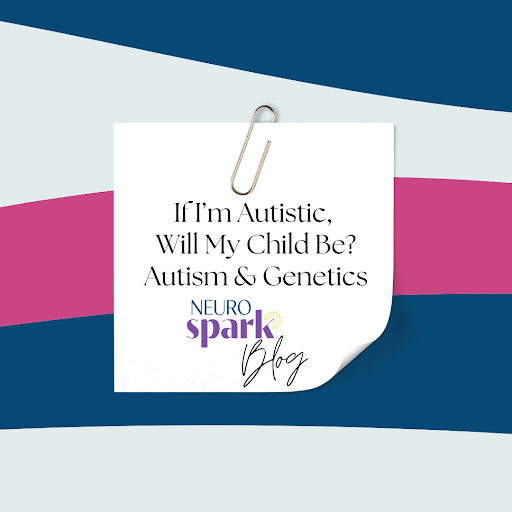
If you’ve recently discovered you’re autistic, or suspect you might be, ou may be asking, “If I’m autistic, will my child be?” This is a very common question among autistic adults, parents, and parents-to-be. The short answer is: autism can run in families, but it’s more nuanced than simple inheritance.
In this post, we’ll explore what research says about the genetic links to autism, how traits can show up differently across family members, and what it really means to support neurodivergent kids—whether or not they share your diagnosis.
What Does It Mean If I'm Autistic?
Autism is a naturally occurring neurodevelopmental variation that affects communication, sensory processing, social interaction, and more. It’s not a disease or a disorder that needs to be cured: it's a different way of experiencing the world.
If you’re autistic, chances are you’ve spent years navigating a world that wasn’t designed for your brain. Now, as a parent, you might be wondering what that means for your child.
If I’m Autistic, Will My Child Be Too?
This is a very common concern, and we feel this question deserves to be addressed here: "if I'm autistic will my child be?". Research consistently shows that autism has a strong genetic component. Here are a few key facts:
Genetic factors are involved. Studies estimate that autism is 60–90% heritable. That means genes play a big role in whether someone is autistic.
Family patterns matter. If one parent is autistic, their child has a higher likelihood of being autistic compared to the general population. The same is true if there are other autistic people in the extended family.
It’s not a guarantee. Even if you’re autistic, your child may not be. And some children may be neurodivergent in different ways (e.g., ADHD, dyslexia, sensory processing differences).
So, while there is a genetic link, the question “if I’m autistic, will my child be?” doesn’t have a simple yes or no answer. It’s a matter of increased likelihood, not certainty.
Different Traits, Same Family
One of the most fascinating things about autism is how varied it can look—even within the same family. For example:
You may be introverted and quiet, while your child is energetic and chatty.
You might mask heavily in public, while your child is more openly expressive.
You might struggle with sensory sensitivity, while your child is more impacted by executive functioning challenges.
Just because your child’s experience doesn’t mirror yours doesn’t mean they aren’t neurodivergent. It’s helpful to be open to all the different ways autism can show up.
Recognizing Signs of Autism in Children
If you're autistic and wondering “if I’m autistic will my child be?” it can be helpful to know what early signs to look for. Keep in mind that early identification isn't about labeling—it’s about understanding and supporting your child in the ways they need.
Some potential signs might include:
Sensory sensitivities (e.g., to sound, clothing textures, or lights)
Intense focus on specific interests
Difficulty with transitions or changes in routine
Delayed or unusual speech and communication patterns
Struggles with social interactions or imaginative play
If you notice traits that resonate with your own experiences, it might be worth seeking an evaluation or simply adapting your parenting to be more neurodivergent-affirming.
If I Suspect My Child Is Autistic, Should I Get Diagnosed?
You don’t need a diagnosis to start making changes that support your child’s neurotype. But many parents choose to pursue formal adult autism assessment to better learn about themselves so that they may better support and model for their autistic kids. Whether they are autistic, ADHD, or just differently wired in a way that isn’t labeled, creating an environment that honors their needs is what matters most.
Here’s what you can do:
Learn more about neurodiversity-affirming practices.
Learn more about their sensory profile.
Watch how your child thrives and struggles, and be curious.
Advocate for accommodations at school or in healthcare.
Consider an evaluation if it feels helpful for them or for you.
And remember, you’re not projecting or imagining things. If you’re wondering “if I’m autistic, will my child be?”—it’s likely because you recognize something familiar. That insight is powerful.
Why This Question Matters
Wondering “if I’m autistic, will my child be?” isn’t just about science. It’s often about fear; of stigma, of misunderstanding, of your child having a hard life. But being autistic isn’t a tragedy.
What harms autistic people is not their neurotype, but the lack of understanding and support in their environments.
By asking this question, you're already showing care and curiosity. You're already one step ahead in creating a better world for your child (autistic or not).
Embracing Neurodiversity For Your Family
Autism often runs in families, not just in genes, but in the way we experience the world. If you're asking “if I’m autistic, will my child be?” you're part of a growing wave of parents bringing self-awareness, compassion, and advocacy to the next generation.
Whether your child shares your diagnosis or not, what matters most is that they feel seen, supported, and allowed to be fully themselves.








